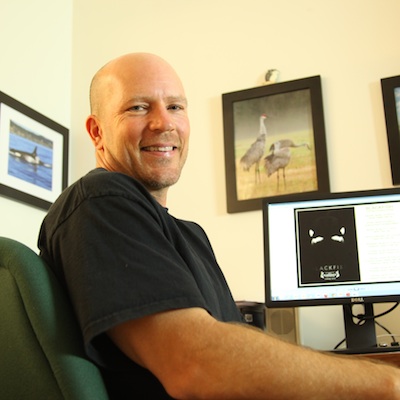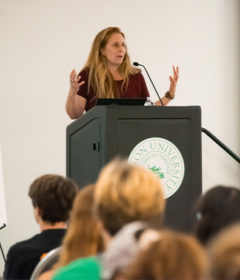Captive whales ‘substantially deprived,’ says researcher
 John Jett, Ph.D., visiting research professor and laboratory coordinator for the Stetson biology department, used to ride killer whales for a living.
John Jett, Ph.D., visiting research professor and laboratory coordinator for the Stetson biology department, used to ride killer whales for a living.
Seriously. Jett (pictured right) was a whale rider and trainer for SeaWorld during the mid-1990s. He later went on to earn his master’s degree in environmental science and his doctorate in health and human performance. He’s now in Blackfish, a documentary that received high praise at the Sundance Film Festival. The film is about the held-in-captivity majestic orcas.
How Jett became fascinated with marine mammals happened in landlocked Kansas where he grew up. “My upbringing really influenced my love of the environment, the outdoors and of animals in general,” he says. “It instilled in me a general sense of curiosity. I basically lived in the woods at the end of our street.”
After completing his undergraduate degree, he worked for an environmental testing laboratory. One morning he was testing water in an amusement park near a small tank that held two bottlenose dolphins. “I interacted with the dolphins while no one was looking,” he recalls.
Jett decided then and there that he wanted to work with these fascinating creatures, so he began “sending applications all over the planet.”
Eventually, he was asked to do a swim and physical fitness test at SeaWorld.
“I was quickly moved to the killer whale area, where I began working and swimming with captive orcas, including Tilikum, the animal that has now killed three people,” he explains.
But it’s his latest research on orcas that’s on his mind right now. In captivity, orcas attract swarms of mosquitoes that transmit a host of deadly diseases.
“Orcas are mammals just like us, so it makes sense that they’d get the same diseases from mosquitoes that we do,” Jett says.
Researchers Jett and physician Jeffrey Ventre, a friend who at one time was also a trainer with Jett at SeaWorld, teamed up to investigate the orcas. They documented the death of two orcas at SeaWorld by mosquito-transmitted viral diseases, including the West Nile and St. Louis encephalitis viruses.
“Orcas held in amusement parks are essentially immobile,” Jett says. “It’s not natural.”
When the animals are immobile, they become easy targets for the mosquitoes.
“The whales’ environmental and social requirements are simply too complex for them to be kept in captivity,” Jett says. “Captivity results in whales living substantially deprived lives compared to their wild counterparts.”
Jett’s and Ventre’s research will soon appear in the Journal of Marine Animals and Their Ecology. Jett has also appeared on CNN, CBS’s 60 Minutes and the Discovery Channel to discuss the plight of captive orcas.
by Bill Noblitt



